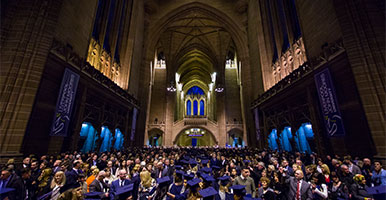Deborah Aydon
Presented by Roger Phillips
Honourable Chancellor, I have pleasure in presenting Deborah Aydon for the award of an Honorary Fellowship from Liverpool John Moores University.
Each year at Graduation, the University's highest honour – an Honorary Fellowship – is bestowed on a select band of individuals outside the University, in recognition of their outstanding achievement in a given field or profession, and who personify and inspire others to 'dream, plan, and achieve.'
We propose Deborah Aydon in recognition of her outstanding contribution to the dramatic arts. At this point I have to say that it is highly unusual to honour two people during the same ceremony in recognition of their joint endeavours but in this instance, the sum of Deborah and Gemma Bodinetz's considerable individual unique talents and experience has enriched and strengthened the region's cultural landscape immeasurably over the last decade. And Deborah as Executive Director has guided and overseen the re-energising of the Liverpool Playhouse and the reinvention of the Everyman Theatre since her appointment in 2003.
Growing up in Oxfordshire, Deborah was taken on regular theatre trips by her father, who himself had been enthused by theatre at the Liverpool Playhouse when he was growing up in Chester. It was the Nigel Williams' play 'Class Enemy' that hooked her interest – I quote 'It knocked my socks off that something as visceral and political and sweary could be on a stage'. But maybe the truth is it was one of the actors, Phil Daniels – he was just 16, she was just 14 and she describes him as her 'bad boy crush'.
Throughout her childhood, her father had also been closely involved in setting up the Chipping Norton Theatre, which opened in a former Salvation Army citadel in 1975 and is still a thriving venue to this day.
The founders were two Royal Shakespeare Company actors, Tamara and John Malcolm, who had moved into the area, when Deborah was just 11. John had been one of the founders of the world-renowned Traverse Theatre in Edinburgh, and perhaps Deborah's driving of the rebuilding of Liverpool's Everyman theatre owes something to his vision; but Tamara in particular was a huge influence on her. Not just as an exotic alien creature in herself, but by providing an object lesson in the ways of astute and commercially-savvy theatre management.
After graduating in French and Film Studies from the University of Kent, her first foot on the arts administration ladder was as a £2-an-hour press and marketing officer for the Canterbury Festival. She'd spent most of the summer dressing the city in promotional posters, bunting and banners – all of which were blown away during the 1987 hurricane that swept through, days before the Festival was due to begin. In the spirit of the old theatre adage that a bad rehearsal leads to a good opening, her arts administration career did take off – albeit less literally – with eight years as General Manager of London's Bush Theatre, followed by executive producer of the Rough Magic Theatre Company in Dublin.
I've been on the Everyman/Playhouse Board for as long as I can remember, and one particular memory is the day Deborah and Gemma were interviewed separately for the separate jobs of artistic and executive directors. With their different experiences, it was no contest for either: importantly, both had recognised the vital importance of Capital of Culture, which the city had just been awarded.
So Deborah joined the Liverpool Everyman and Playhouse in 2003 as executive director – a role which involves a lot more than raising the revenue funding and ensuring it is spent wisely. It ranges from looking after the contracts to keeping the loos flushing. And what no-one really knew at the time was that they would have to become experts on demolition and planning and architectural plans for a rebuilt Everyman – none of which was in their job description.
Deborah, in particular had to lead the necessary required capital fundraising from many organisations, including Trusts, the arts council and the city council, as well as a £1 million fundraising campaign, part of which included, for Deborah, a (successful) sponsored parachute jump. The past 11 years have been an enormous challenge for both.
Professionally for Deborah, it has been about steering artistic risk – many executive directors just look at the bottom line, whereas Deborah works to make sure Gemma's vision can be fulfilled; working for the renaissance and development of the two distinct and different theatres; and encouraging new audiences through innovative schemes. This last element underpins the University's recent confirmation as Principal Partner of the Everyman and Playhouse Theatres for the next three years – a partnership very close to Deborah's heart and one she has personally shaped, with the Vice Chancellor, as part of LJMU's cultural offering, so that all of our students gain a meaningful benefit from the University's association with the theatres and can access the full range of internationally-acclaimed productions throughout the year.
When they were appointed, Deborah and Gemma issued a joint statement saying "We look forward to building on the two theatres' separate yet equally important histories, tapping into the creative dynamism of Liverpool and Merseyside, and propelling the Everyman and Playhouse into a bold new phase."
We are well into that "bold new phase" now, and we are all the beneficiaries of their vision and endeavour – their dream and planning has achieved everything this city could have wished.
Thus, it is with great personal pleasure that I present Deborah Aydon this most distinguished adopted daughter of our city, for admission to our highest honour, as Honorary Fellow of Liverpool John Moores University.



